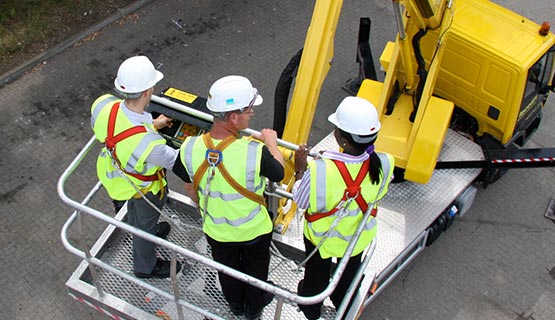IPAF training courses offer health and safety training specific to the use of Mobile Elevated Work Platforms, such as boom lifts and scissor lifts. The courses are run by independent organisations and institutions, but are overseen by the International Powered Access Federation (IPAF), and attendees receive a PAL card upon successful completion of the training.
Courses typically take up to a day to complete, and they offer full education on the safe operation of the machinery, completing safety and hazard checks, and the identification and proper use of safety equipment such as safety harnesses. They also teach attendees how to implement emergency procedures, because even with full training there is still the danger of an accident or an incident that can lead to injuries being sustained.
Elevated platforms offer access to otherwise inaccessible areas and, as such, they can prove invaluable in certain circumstances. Whether you require access to elevated areas on a worksite, or need to work on an individual project that requires this access, it may only be safe to use machinery like elevated platforms, if the ground is stable, or if a stable base can be provided. Part of your IPAF training will teach you to analyse the site, and specifically the ground where the machinery will be placed, to determine whether it is safe and whether any additional anchoring is needed. An uneven ground surface could prove to be one of the greatest potential hazards.

The machinery itself also needs to have safety checks and analyses completed, with checks typically completed prior to use, after use, and intermittently during use. Additional checks may also be considered necessary in adverse weather conditions, or following any major changes on the site. IPAF courses provide the tools and knowledge that you need in order to be able to identify when checks should be made, and what these safety checks should incorporate.
Another important element of elevated platform safety is the use of safety equipment. Anybody working at height should wear appropriate safety clothing, while harnesses and additional equipment can be used to further ensure that the risk of accidents is minimised, and the potential for injury is identified and acted upon.
Different types of mobile platform have different mechanisms, are commonly used in different circumstances, and therefore have their own specific risks. These differences mean that attendees will be trained and educated on the safe use of a particular type of mobile machinery, rather than on all forms of elevated platform. Employers are encouraged to check the PAL card of any potential operator to determine the type of machinery that they are trained to work with.
Health and safety is important in all workplaces, but especially so on worksites and when working at height. IPAF courses aim to ensure that attendees are capable of identifying possible risks, mitigating those risks, and helping to ensure the safety of everybody concerned. Employers favour those with PAL cards because they know that they have a high standard of health and safety training, while employees with IPAF certification can help improve their odds of landing a relevant and decent job.
The Safety Maintenance Company offers a range of IPAF training courses, enabling individuals to get their PAL card or to allow employers to ensure that all of their employees have the appropriate health and safety training.



